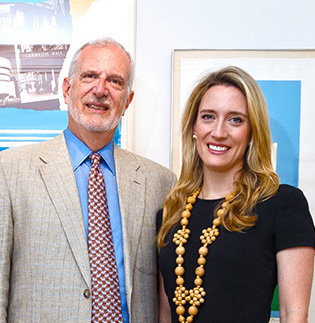A year ago, Frederick Peters and his daughter Clelia were butting heads over the future of their family brokerage, Warburg Realty. The argument got heated and Frederick, the quintessential Upper East Sider and proper to a fault, did the unthinkable. He hung up on his daughter.
Clelia came on board as a part-time consultant two years ago, and her proposed reforms hadn’t always thrilled Frederick. A growth-obsessed Boston Consulting Group alum, she wanted to hire more agents and revamp management, which meant bringing the ax down on several veteran staffers. Frederick wasn’t opposed to change, but Clelia, in his view, was moving uncomfortably fast, and he felt responsible for the management team he’d had in place for years.
After 24 hours of silence between them, the pair had to attend an industry event together. As they walked to the venue together, they began to hash out their differences. She began to cry. And then, so did he.
“We both got very emotional,” he told The Real Deal. “I had this moment of revelation that I had to stop being so anxious about things changing and letting go of some of my power. The only way this was going to work was if I really, in my heart, acknowledged the enormous contribution that she was able to make and then let her make it.”
“It was me embracing the fact that we were going to be partners,” he added.

Fred and Clelia Peters
Today, with 127 agents and about $256 million in current listings as of March 27, Warburg looks very different than it did a year ago, largely due to a Clelia-engineered overhaul.
“I’d like to see us effectively double the size of the company within the next five years, both by number of agents and by revenue,” Clelia said. “We’re in a very privileged position — we’re not forced to grow or die. Some of our very growth-oriented competitors are not that fortunate. We could stay exactly the same size and be totally fine and happy, but we see opportunity.”
Frederick owns 51 percent of the company, with the rest being held by brokers Jane Bayard, Linda Reiner, Lisa Deslauriers, Bonnie Chajet, Ronnie Lane, Wendy Greenbaum, Jane Andrews and Judith Thorn.
Clelia was named president of the firm last month, responsible for the company’s overall strategic vision, while Frederick remains CEO, handling the firm’s day-to-day deal-making activities. The firm’s four offices all have new sales directors. Warburg is also completely rebranded, with a new logo, marketing materials and a major website upgrade, all spearheaded by design firm Mucca, which designs Keith McNally restaurants such as Pastis and Balthazar. It’s even opened a small office in a co-working space in Brooklyn, a remarkable turn for a firm that made its bones selling grand prewar apartments on Central Park West and Fifth Avenue.
“They’re trying to show that they’re more cutting edge,” said Olshan Realty’s Donna Olshan. “It’s all about branding and trying to look a little edgier.”
Warburg will soon announce several new initiatives, including a partnership with Barnes International, a luxury brokerage active in London and Paris. It plans on establishing a “French desk,” which will service French-speaking referral clients and present New York properties to Barnes’ clientele. It’s also partnering with Palm Beach-based brokerage the Fite Group for referrals to and from Florida. In this, Warburg is mimicking what many of its competitors, including Douglas Elliman, the Corcoran Group and Town Residential, have done over the last two years.
In addition, the brokerage plans to release several new reports in partnership with wealth intelligence platform Wealth-X, which will track spending habits of the super-rich. Elliman partnered with Knight Frank on a similar initiative, the global wealth report.
The restructuring was far from bloodless: Several top executives have left the firm, including sales directors Robert Doernberg and Jane Bayard, as well as Michael Guerra , an Elliman veteran who Warburg recruited last April to lead its Brooklyn push. On the broker side, Richard Steinberg, formerly Warburg’s top producer, moved to Elliman last year amid the shake-up, though he said his move wasn’t a result of the changes. And Miles Chapin, who was the firm’s third-highest producer last year, is now at Brown Harris Stevens. Top producers Maria Diaou, Jay Glazer and Angel Joseph also departed.
Some left of their own accord and others were given their walking papers, sources said. New hires include Brennan Zahler of Town Residential, who will head the company’s newly revamped Tribeca office, and Jasmine Takanikos, a marketing consultant focused on brand marketing for agents. All in all, the firm has hired 30 new agents over the past year.
Griping about Clelia’s changes became somewhat of a sport within Warburg.
“Warburg was primed for a change but I don’t know if it was ready for that change,” said one former employee, who spoke on the condition of anonymity. “You had a lot of people who were really proud of where they worked. They were saying: ‘We’re not broken, why are you trying to fix us?’”
A split emerged between the new guard of agents who embraced change and the veterans who were resistant to it, sources said.
“You need to respect the people that have been doing business there for a really long time,” said David Salvatore, a former Warburg agent who is now at Core. “Even though I wouldn’t follow their lead, the older agents have been raking it in for years and they know a lot.”
Much of the old guard contended that Clelia’s lack of brokerage experience made her the wrong person to set strategy.
“If Fred said we want to change the company colors to pink, everyone would go along with it because it was him who said it,” one insider told TRD. “But Clelia was just a little girl to them.”

Richard Steinberg left the company for Elliman
Steinberg said that Clelia’s changes actually made it tougher to leave.
“If anything, her coming on board made it harder for me,” he said. “I was 100 percent in favor of everything she was doing. She was going to bring us into the 21st century. Unless you move and keep up with things, you’re going to be left in the shadows.”
Rather, he said his move to Elliman was about getting involved in new development work. “I didn’t think they could compete in development projects with the big boys,” he said.
Indeed, some longtime agents were on board with the changes.
“There was a time when I felt that Warburg was not completely as it should be and then Clelia came,” said Linda Reiner. “All of a sudden, the old seemed new again and the new was unbelievable.”
But, for Frederick, seeing longtime staffers leave was tough to take.
“She’s more of a hard-ass than I am,” Frederick said of Clelia. “I’m not suggesting that she’s not someone that’s well-considered but she’s more impetuous and also probably more impatient. The hardest thing for me to let go of was always people. Whether they decide to go or we decide they should go, it’s hard for me either way. I’m really a softie. It’s easy to tug on my heart strings.”
Meanwhile, the company’s revenues may have taken a hit: Warburg closed $316.9 million in deals in 2015, a 16 percent drop year-over-year. Its listings volume was also down slightly at the time of TRD’s most recent count, $255.9 million compared to $262.5 million a year ago.
But Clelia took issue with TRD’s methodology and said the firm’s business is actually on the up, thanks to its work on both the buy and sell sides of the market. The ranking, she noted, does not capture those buy-side deals.
Jason Haber, whose firm Rubicon Property was purchased by Warburg in 2014, said he’s confident in the future of the firm based on its financials alone.
“Warburg’s got an incredible healthy balance sheet,” he said. “A lot of these companies you find there is no there, there. Their EBITA is upside down. With Clelia here, we’re changing before we have to.”
The Peters hope the new offerings will help to Make Warburg A Compelling Place for agents at a time when many firms are relying on big pay packets — and in some cases, equity positions — to attract talent.
“What I regret in the current environment is the cutthroat nature of the competition, which never existed in the same way before,” Frederick said. “We’ve become like the finance industry in my opinion with these somewhat ridiculous talent wars in which people bid up incredibly high in their desire for recruits. Over the long run, it’s not very sustainable and it’s not good for the business. I don’t think we necessarily need to offer people what these other guys are offering so long as we’re offering value in other ways.”
Clelia agreed, ruling out sweeteners such as high commission splits that “compromise our profitability.”
“It’s easy to get sucked into the drama around this stuff and to start to make fear or anxiety-based or reactive decisions, “ she said. “The most important thing is to stay focused on who we are and believe that the people for whom we’re a fit are going to see that.”
And Frederick has no intention of letting the firm evolve into something he doesn’t recognize.
